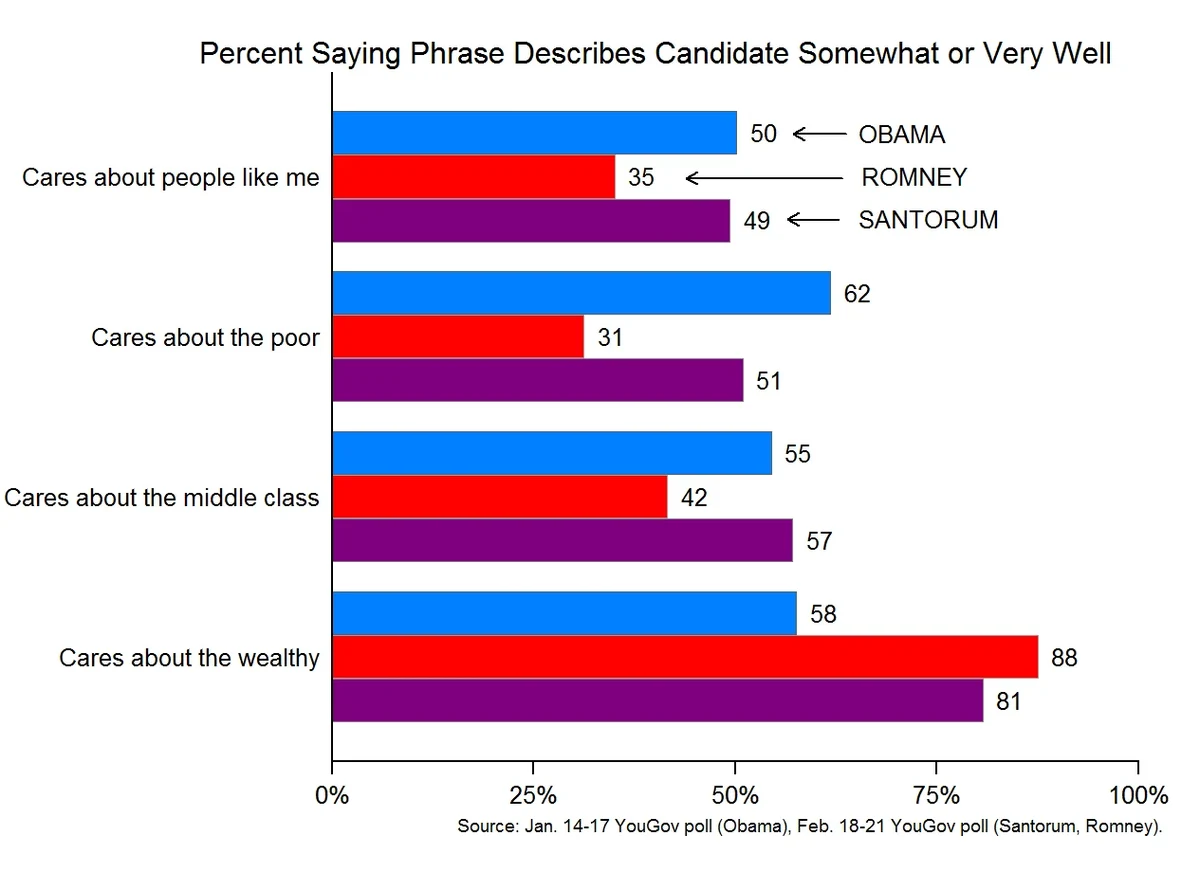The GOP primary campaign continues to draw attention to wealth and social class. Mitt Romney’s most recent offhand remarks—about his wife’s “couple of Cadillacs” and his friendships with NASCAR team owners—once again illuminated his privilege. Meanwhile, Rick Santorum’s challenge to Romney is built on his possible appeal to blue-collar voters—an appeal that could even help Santorum against Obama in November.
How does Santorum stack up to both Romney and Obama in how voters perceive their personal wealth and their sympathy for people of different economic classes?
Drawing on a Feb. 18-21 YouGov poll, we use the same indicators analyzed in our earlier post comparing Romney and Obama. Respondents were asked how well these terms described Romney and Santorum: is personally wealthy, cares about people like me, cares about the poor, cares about the middle class, and cares about the wealthy. We compare these evaluations to evaluations of Obama from a January 14-17 YouGov poll.
(Click to enlarge)
Views of the candidates’ personal wealth are depicted above. The vast majority of respondents said that “personally wealthy” describes each candidate somewhat or very well. However, Santorum is perceived differently than Romney and Obama. Only 24% believe that “personally wealthy” describes Santorum very well, while 45% believe this of Obama and 77% believe this of Romney. (That 77% figure is 5 points higher than in early January.)
Moreover, Santorum is viewed as caring more about “people like me” as well as the middle class. Indeed, his numbers are nearly identical to Obama’s:

(Click to enlarge)
At the same time, both Santorum and Romney are perceived as caring more about the wealthy than the poor. But separating the “somewhat well” and “very well” responses reveals a difference: 56% think that “cares about the wealthy” describes Romney very well, while only 31% say that about Santorum.
Santorum and Romney are alike in this respect: how perceptions of their personal wealth are connected to perceptions of how much they care about wealthy people. For Obama, as we reported before, this correlation is small. In the January 14-17 poll, the correlation is 0.16, where 0 equals no positive correlation and 1 is a perfect positive correlation). The same correlation for Santorum is 0.60; for Romney it is 0.71. For these Republican candidates more than for Obama, perceived personal wealth is associated with perceived solidarity with wealthy people.
And whereas the belief that Obama cares about the wealthy is positively associated with the belief that he cares about “people like me” (r=0.19), for Romney and Santorum, there is no significant association, either negative or positive. This represents an improvement for Romney. In our earlier analysis, the two beliefs were negatively correlated. Nevertheless, Obama still maintains an arguable advantage: any sympathy he may have for the wealthy is, in voters’ minds, consistent with concern for “people like me.”
Whether Santorum can effectively challenge Obama thus remains an open question. Even if Obama cannot attack Santorum for his Cadillacs, he might criticize Santorum’s tax plan, whose largest tax cuts would go to the wealthiest. But compared to Romney, Santorum appears to have a definite advantage. If politics were the Daytona 500, voters would put Santorum with the fans in the stands, not up in the owner’s box.









